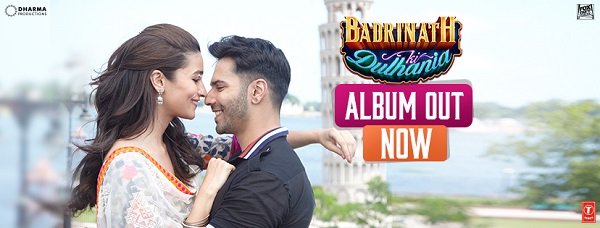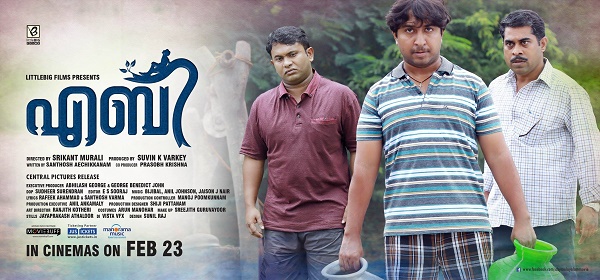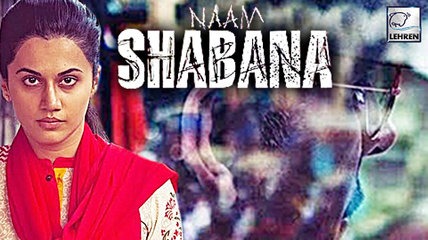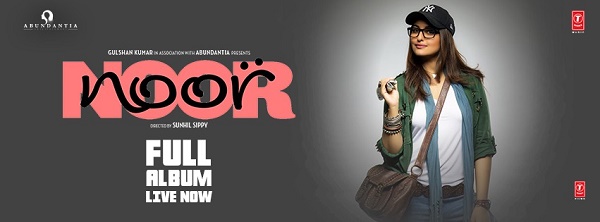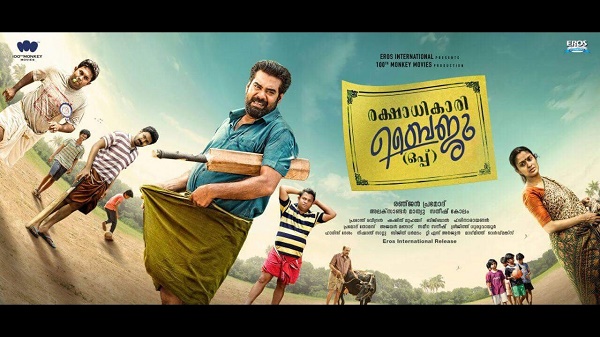Songs and credits at the end.
The most remarkable aspect of Aashiq Surrender Hua is that composer Amaal Mallik seems to have finally gotten over the Sooraj Dooba Hai jinx when it comes to dance songs. Not saying that this sounds fresh either. The folk percussion dominated arrangement is very much of the tried and tested variety, but it is engaging. Mallik himself delivers the male vocals in sprightly fashion, alongside an equally lively Shreya Ghoshal. The familiarity in sound is a lot more prominent in Mallik’s second song, the mellow melodic piece called Roke Na Ruke Naina. There is some nice work on the arrangement front, especially in that first interlude with the flute and guzheng (Tapas Roy). However, those are only a mild respite from the overwhelming déjà vu, and Arijit Singh’s rendition only helps aggravate it. Frontman of Delhi based sufi rock band Nasha, Akhil Sachdeva, does his composing debut with Humsafar. Once again nothing new in offer here by way of melody or arrangement, but it could still have made for an okayish listen if not for the composer’s own awkward vocals.
After that promising debut with Vayu Srivastava in Tanu Weds Manu Returns in 2015 (Banno), Tanishk Bagchi this year seems to be running a serious risk of being stuck with remixes. While it was Humma Humma in OK Jaanu, the young composer gets to adapt two songs here, both of which were in turn adapted from other sources, interestingly. To be fair, in Badri Ki Dulhania there is a sizeable contribution from Bagchi; it is only the main hook that the song borrows from Shankar Jaikishan’s Chalat Musafir from Teesri Kasam (which itself was a folk tune adaptation). And it is an entertaining remake too, well delivered by Dev Negi, Neha Kakkar, Monali Thakur and Ikka. Bagchi’s second offering is Tamma Tamma Again, a revamp of Bappi Lahiri’s hit 1990 song which was inspired of Mory Kante’s Tama Tama (I personally prefer Laxmikant Pyarelal’s Jumma Chumma sourced off the same piece). Some nice touches on the remix here, like the retention of the original vocals by Bappi Lahiri and Anuradha Paudwal, and the sampling of Ameen Sayani’s voice. What does not help the song’s case one bit is Badshah’s rapping.
And the Dulhania franchise continues to disappoint with its music, in fact this soundtrack rates even lower than the first one! This is also the weakest Dharma movie soundtrack in a very long time.
Music Aloud Rating: 2/5
Top Recos: Badri Ki Dulhania, Aashiq Surrender Hua
This review first appeared in the Mumbai edition of The Hindu.
Musician Credits
Song: Aashiq Surrender Hua
Singer: Amaal Mallik,Shreya Ghoshal
Music: Amaal Mallik
Lyrics: Shabbir Ahmed
Song Arranged & Produced By – Sourav Roy & Amaal Mallik.
Additional Programming – Zaid Patni (Dj Zeek)
Mixed & Mastered By – Eric Pillai At Future Sound Of Bombay
Guitars & Mandolins – Ankur Mukherjee
Live Rhythms & Percussions Arranged, Conducted & Performed By Dipesh Varma
Rhythmists – Dipesh Varma, Keyur Barve & Omkar Salunkhe
Vocal Supervisor – Amey Londhe
Vocals Recorded By – Amey Londhe & Vincent Joseph (Audiogarage Studios) Vijay Dayal & Chinmay Mestry (Yash Raj Studios)
Live Instruments Recorded By – Vijay Dayal & Chinmay Mestry At Yash Raj Studios
Mix Assistants – Michael Edwin Pillai & Lucky (Future Sound Of Bombay)
Music Assistants – Shishir Samant, Krish Trivedi, Yash Narvekar, Gaurav Sanghvi, Anvay Patil, Rujul Deolikar
Backup Chorus & Whistles – Krish Trivedi
Song: Roke Na Ruke Naina
Singer: Arijit Singh
Music: Amaal Mallik
Lyrics: Kumaar
Song Arranged & Produced By – Aditya Dev & Amaal Mallik
Additional Programming – Sourav Roy & Rohit Choudhary
Mixed & Mastered By – Eric Pillai At Future Sound Of Bombay
Live Guitars – Ankur Mukherjee
Mandolins & Guzheng – Tapas Roy
Live Rhythms & Percussions Arranged, Conducted & Performed By Dipesh Varma
Live Drums – Debashish Banerjee
All Vocals & Live Instruments Recorded By – Shantanu Hudlikar, Abhishek Khandelwal & Manasi Tare At Yash Raj Studios
Mix Assistants – Michael Edwin Pillai & Lucky (Future Sound Of Bombay)
Music Assistants – Krish Trivedi, Shishir Sawant, Yash Narvekar,Gaurav Sanghvi, Anvay Patil, Rujul Deolikar
Song: Humsafar
Singer:Akhil Sachdeva, Mansheel Gujral
Music: Akhil Sachdeva
Lyrics:Akhil Sachdeva
Song Production And Theme Music Composed By : John Stewart Eduri
Guitars :Veljohn
Recorded At : Enzy Studios & J.S. Workstation
Sound Engineer At Enzy Studios: Julian Mascarenhas
Mix Assistant Engineers- Michael Edwin Pillai & Lucky
Song Mixed & Mastered By Eric Pillai(Future Sound Of Bombay)
Song : Badri Ki Dulhania (Tiltle Song)
Singers – Dev Negi, Neha Kakkar, Monali Thakur, Ikka
Music – Tanishk Bagchi
Lyrics -Shabbir Ahmed
Additional vocals – Rajnigandha Shekhawat
Programming -Tanishk Bagchi
Additional Programming- Ganesh Waghela
Live Rhythms & Percussions arranged & conducted by Dipesh Varma
Musicians- Dipesh Varma,Keyur Barve,Omkar Salunkhe, Shikhar Naad Qureshi & Jignesh Patel
Dhol played by Deepak bhatt’s DFS
All live Instruments recorded at Yashraj Studios by Vijay Dayal
Assistant- Chinmay Mestry. Harmonium and Banjo -Pradip Pandit
Mix Assistant Engineers – Michael Edwin Pillai & Lucky
Song Mixed & Mastered By Eric Pillai(Future Sound Of Bombay)
Song: Tamma Tamma Again
Singer:Bappi Lahiri,Anuradha Paudwal,Badshah
Music: Bappi Lahiri,Tanishk Bagchi
Lyrics: Indeevar, Badshah
Vocals Dubbed By Ameen Sayani
Mandolin – Tapas Roy Recorded At Paresh Music Studio
Programming- Tanishk Bagchi
Additional Programming-Ganesh Waghela
Chorus Singers -Dattatray Mestry, Archana Gore, Arun Ingle, Aparna Ullal, Mandar Apte, Mayuri Patwardhan, Nitin Karandikar, Deepti Rege
Chorus Vocals Recorded At- Sound Ideas Studio By Kittu
Mix Assistant Engineers – Michael Edwin Pillai & Lucky
Song Mixed & Mastered By Eric Pillai(Future Sound Of Bombay)
